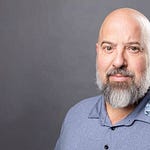When Marine Corps Osprey pilot Tim Sabean left the cockpit, he didn’t just switch careers. He stepped into one of the most ambitious energy projects in U.S. history, Bechtel’s Thacker Pass lithium mine.
Lithium may not sound as glamorous as flight ops, but this project could redefine America’s energy security. It’s the largest known lithium deposit in the country, powering everything from EV batteries to grid-scale storage — and reducing our dependence on foreign supply chains.
“It’s the best of both worlds,” Tim says of the Osprey, “a plane and a helicopter.” But now, he’s learning an entirely new operating environment: multi‑billion‑dollar mining and metals construction.
Why Lithium? Why Now?
Strategic resource: Lithium is the backbone of batteries for EVs and energy storage. Controlling domestic supply is critical for U.S. competitiveness and national security.
Scale of Thacker Pass: This isn’t a pilot project, it’s the largest lithium clay deposit ever recorded globally, located in northern Nevada. This can make America the Saudi Arabia of Lithium
Private‑public alignment: Backed by Lithium Americas, GM, and DOE financing, this project signals a turning point in domestic mining and supply chain policy.
“If we do this right,” Tim explains, “it could open up a lot of doors for the market.”
The Veteran Blueprint: Breaking into Energy
Tim’s path looks different from many transitioning vets:
Grad school pivot: He earned a master’s in sustainable energy from Johns Hopkins, balancing coursework with deployments and family life.
Networking over job boards: Tim leveraged his new Project Vanguard connections and direct outreach to veterans at companies like Bechtel, skipping the resume application black hole online.
Skill translation: ‘Everyone thinks they’re a project manager in the military. Then you realize managing billion‑dollar budgets is a different animal.’
For veterans considering energy careers: don’t underestimate your soft skills: decision-making under pressure, mission focus, and team building. Those translate even if the technical side is new.
Reality Check: The Civilian Transition
The move from military to corporate life isn’t seamless:
Speed: “I thought civilians would be slow. It’s been the opposite — everything’s happening fast.”
Culture Shift: Trading cammies for daily wardrobe decisions. Learning corporate hierarchies that operate on influence, not rank.
Humility Required: “I applied to jobs thinking I was a shoo‑in. No one knew what an Osprey was. That was humbling — and good for me.”
Energy Transition Without the Politics
One of Tim’s biggest insights? The clean energy fight isn’t about tree‑huggers vs. drillers. It’s about All of the Above: options, resilience, and realism:
“You can’t ignore that oil and gas isn’t going anywhere soon. But we can make energy more available and give people freedom of choice.”
Takeaways for Veterans (and Employers)
For vets:
Start networking early and build your network before you get out. You’re part of a huge and influential alumni group.
Consider grad school if you want to pivot industries.
Translate your experience honestly: mission focus > flashy titles.
For employers:
Veterans may not know megawatts from kilowatts, but they can learn fast.
Hire for character, train for skill.
Integrate veterans you already employ into your hiring process to guide candidates.
Why This Matters
The fight for American energy dominance isn’t just about tech or policy, it’s about people. Veterans like Tim bring the grit, precision, and trust this industry needs to scale.
And as Project Vanguard continues to grow, these stories become roadmaps for the next wave of vets asking: What’s my next mission?












